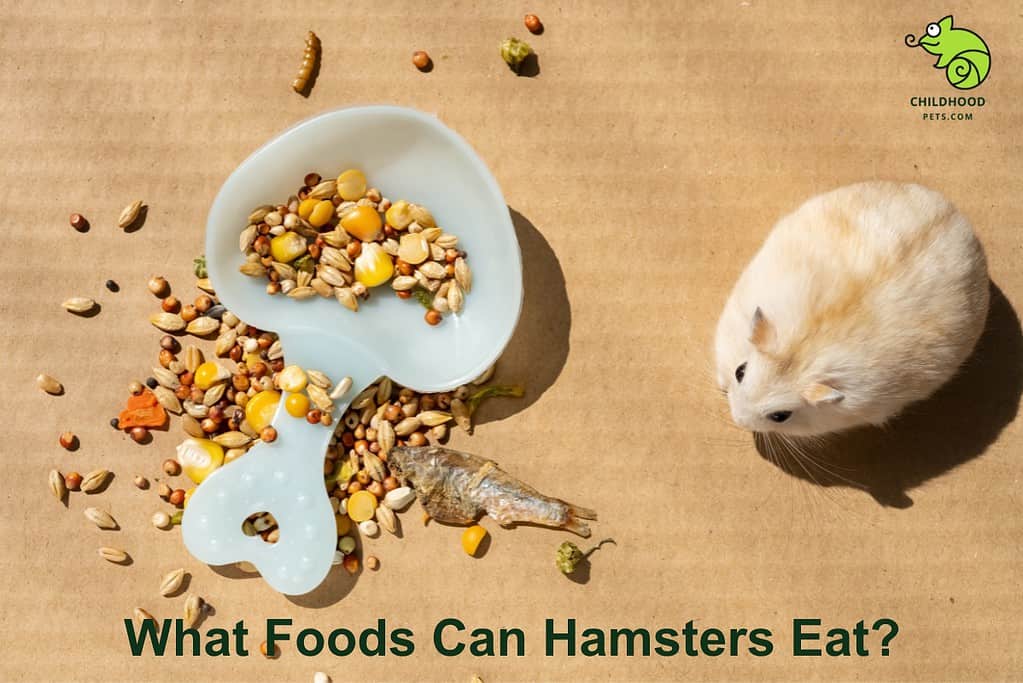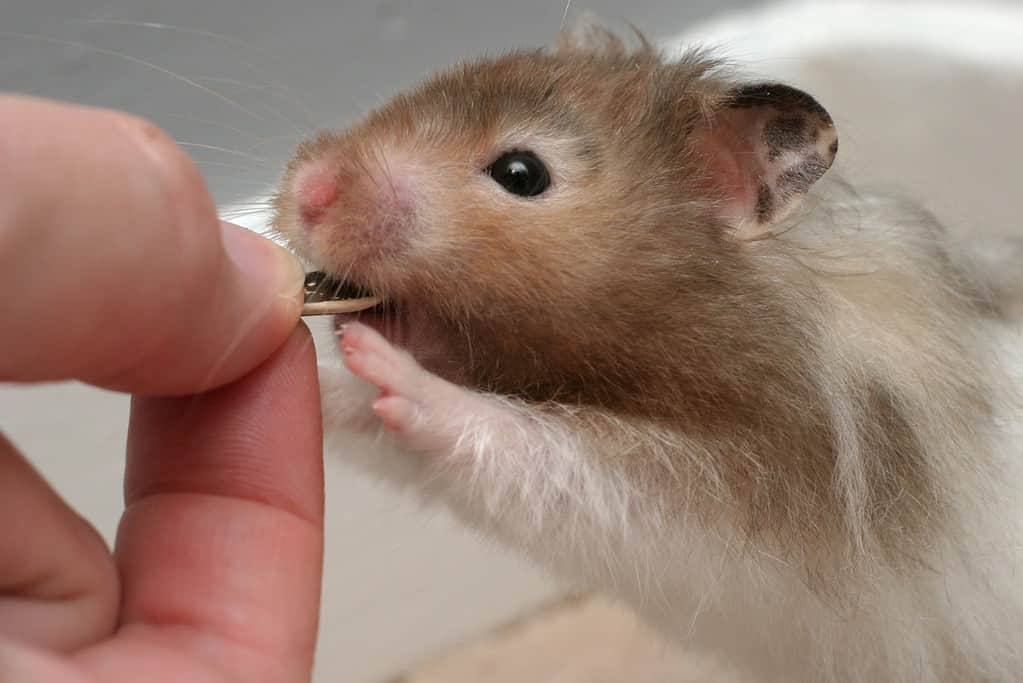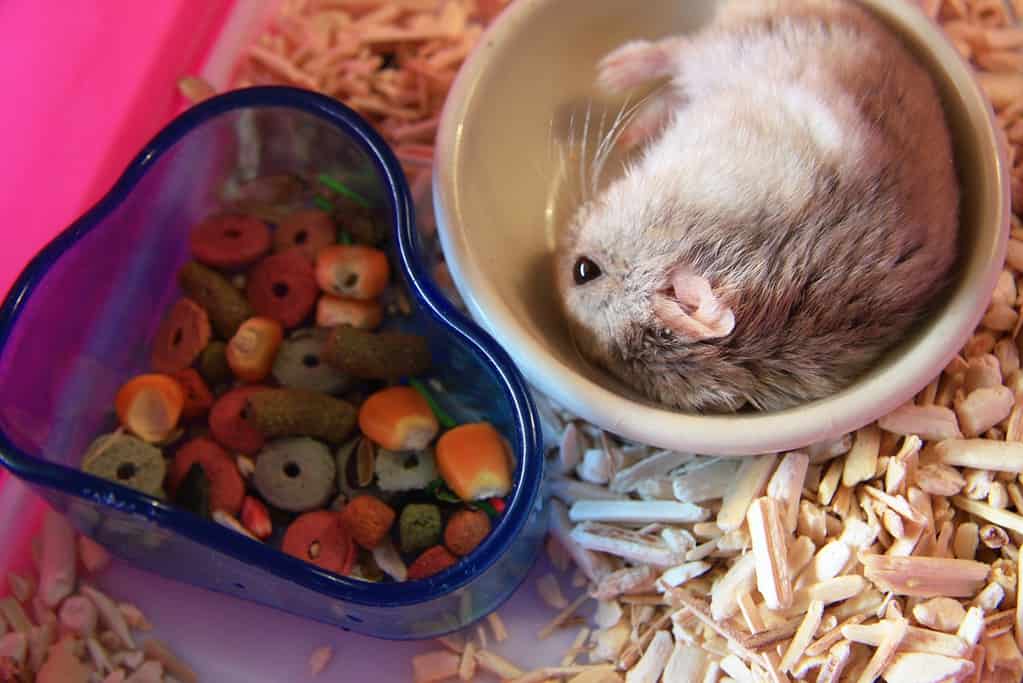
Hamsters are small, furry creatures that make great pets due to their friendly nature and entertaining behaviors. They’re adorably cute and surprisingly easy to care for. To keep your hamster healthy, providing them with a balanced diet is essential. But what foods can hamsters eat?
As a whole, hamsters should be fed a balanced diet of fresh fruits, vegetables, and commercial hamster food such as pellets, grains, nuts, and seeds. Occasionally treat them with crickets and small amounts of cooked chicken or fish, eggs, and pasta.
In this article, we’ll look at the different types of hamster food available and discuss what foods are safe for your pet. So let’s get started!
What Foods Can Hamsters Eat? A Complete Diet
Hamsters are omnivorous creatures that enjoy a varied diet. Knowing what foods hamsters can eat is essential to keep your furry friend healthy. Here are some great food choices for feeding your pet hamster.
Fruits
Hamsters love to eat fruits! Apples, bananas, strawberries, blueberries, raspberries, blackberries, and grapes are all great options to give your pet. Just remember that some fruits contain more sugar than others and should be given in moderation. Give your furry friend a sweet treat every now and then for ultimate happiness!
Vegetable
Hamsters can benefit from a wide variety of vegetables. The best choices are dark, leafy greens such as kale, spinach, and romaine lettuce. These offer the most nutritional benefits for hamsters and help keep them healthy. Other great options include carrots, peas, bell peppers, celery, and cucumber.
Herbs
Herbs are a great source of Vitamin C and can also provide other health benefits to your pet. Adding them to their meals can bring extra flavor and nutrition. It’s an easy way to boost the quality of their diet!
Common herbs like parsley, oregano, rosemary, and thyme can be served in small amounts as occasional hamster treats. These herbs are yummy for your furry friend and contain antioxidants that can help support a healthy immune system. Ensure not to overdo it – too much herb can harm your pet.
You should always wash the herbs before feeding your hamster and ensure they are free from pesticides and other contaminants.
Grass
Hamsters can eat grass and hay but should only be fed in moderation. In the wild, hamsters forage for these items and enjoy eating them. It is not recommended to be the main component of their diet. Hay provides a good source of fiber for hamsters, which helps improve digestion and prevent constipation. However, too much hay can lead to weight gain and digestive issues.
Mixture of Different Seeds

Seeds provide essential vitamins, proteins, and minerals that are highly beneficial for the hamster’s health. Additionally, offering a mix of different types of food, like seeds, fruits, and vegetables, is vital as this may help stimulate their appetite. Feeding fresh foods and quality manufactured items like pellets is necessary to ensure the best nutrition intake.
Unseasoned Meat
Unseasoned meat, such as cooked chicken or boiled eggs, can make an excellent treat for your hamster. You can give them small amounts of lean fish, cooked beef or pork, and insects such as mealworms. In addition to providing protein, these foods will help keep your hamster’s teeth healthy. Ensure all meats are unseasoned and do not upset your pet’s delicate stomach.
Commercial Hamster Pellets
High-protein pellets are designed to give your pet hamster the protein they need for a healthy diet. These pellets, like Kaytee Fiesta Pet Hamster And Gerbil Food, can be found in pet stores or online and come in various shapes, sizes, and flavors. The ingredients usually include soybean meal, cornmeal, wheat middling, fish meal, ground oats, and other animal sources.
Not only do these pellets provide your hamster with protein, but they also provide essential vitamins and minerals to keep them healthy. You can feed your pet hamster a diet of high-protein pellets as its primary food source or supplement it with fresh fruits and vegetables for variety. A good rule of thumb is feeding your hamster one teaspoon of high-protein pellets for every 5 grams of body weight daily.
Whole Grain Bread and Cereals
Bread and cereals can be a great source of nutrition for your hamster. Hamsters love to gnaw on whole grain pieces of bread and cereals, as they provide the fiber hamsters need to stay healthy. Whole grains are high in fiber, B vitamins, iron, and other minerals that help support a healthy digestive system.
Additionally, these foods provide carbohydrates that give energy and help hamsters stay active. When feeding your pet a whole-grain diet, choosing ones with no added sugars or artificial flavors is essential.
Are Pellets Good for Hamsters?

Yes, pellets are an excellent dietary option for hamsters. Pellets provide the essential nutrition that your pet needs, including proteins, carbohydrates, vitamins, and minerals. Pellets come in different shapes, colors, flavors, and sizes, so you can find something that your hamster will enjoy eating.
They also help promote dental health by encouraging chewing, which helps keep teeth worn down and healthy. When selecting a pellet diet for your hamster, look for a quality product explicitly formulated for hamsters that meets their dietary needs.
What Insects Do Hamsters Eat?
Insects are a natural food source for wild hamsters, and they can make an excellent treat for your pet. You can provide your hamster with mealworms, crickets, earthworms, or wax worms as a healthy snack. When selecting insects for your hamster, be sure to choose ones that have been raised organically or in captivity. Wild-caught insects could contain parasites or pesticides that are harmful to your pet.
How Much Food Should I Give My Hamster?
Hamsters need to be fed small amounts of food regularly throughout the day, with a total daily amount no more significant than what can fit in two tablespoons. The amount will depend on the size of your hamster and its individual activity level.
A general guideline is one tablespoon per day for dwarf hamsters and two tablespoons for more giant Syrian hamsters. It is best to spread out their meals into two or three feedings per day rather than providing a single large meal.
You can also supplement your regular diet with occasional treats such as sunflower seeds, unsalted nuts, and fresh vegetables and fruits.
Are There Any Foods That Hamsters Should Avoid Eating?
Yes, there are some foods that Hamsters should avoid eating. Foods that contain a lot of sugar can be dangerous for hamsters, as they are more prone to obesity than other animals. Additionally, citrus fruits such as oranges and lemons should not be fed to hamsters, as they can cause stomach upset.
Hamsters also cannot digest raw beans, so these should be avoided. Foods such as chocolate, onions, grapes, and garlic can all be toxic to hamsters and should never be fed.
Is It Safe for a Hamster To Eat Dairy Products?
No, it isn’t safe to give hamsters dairy products as they are usually lactose-intolerant. This can result in digestive issues such as an upset stomach or diarrhea. Dairy also contains high fat levels, which can lead to weight problems and various health issues for your furry friend. To ensure their safety and well-being, it’s best to avoid giving them dairy.
What Foods Make Hamsters Happy?
When making your hamster happy, you should look for foods high in fiber and containing plenty of whole-grain ingredients. Whole-grain pieces of bread and cereals are a great way to give your pet all the nutrition they need without overfeeding them.
Foods like oats, barley, wheat berries, quinoa, or brown rice provide an excellent energy source for your hamster. You can also give them fresh fruits and vegetables like carrots, apples, or bananas as a delicious treat. Just be sure to avoid sugary foods, which can cause digestive issues in hamsters.
Final Thoughts
Hamsters can eat various foods, including vegetables and fruits, grains, high-quality commercial pellets, small amounts of cooked lean meats, and occasional treats. It is essential to provide a balanced diet for your pet by varying the food types offered. It is also necessary to ensure that any food you feed your hamster is fresh, unspoiled, and free from contaminants. It is essential to avoid sugary foods, as too much sugar can harm a hamster’s health.
Frequently Asked Questions
Can hamsters eat cucumbers?
Yes, cucumbers are a safe and healthy snack for hamsters. Cucumber is an excellent source of hydration for hamsters and vitamins A, B1, and C. However, avoid adding any added sugar or salt to the cucumber. Hamsters should only eat fresh cucumber with no added seasonings or flavors.
What can I feed my hamster as treats?
Hamsters enjoy crunchy fruits and vegetables as treats. Cooked eggs make an excellent treat for hamsters and provide them with essential protein and fats. Try giving them apples, carrots, broccoli, cucumber, and other crunchy fruits or veggies your hamster enjoys.
Can hamsters eat rice?
No, hamsters cannot eat rice. Rice is not a natural food source for hamsters and can be challenging to digest. They could choke on it if the grains are too large or not cooked. Sticking with raw foods such as vegetables, fruits, small amounts of boiled eggs, and commercially available hamster food is best.
